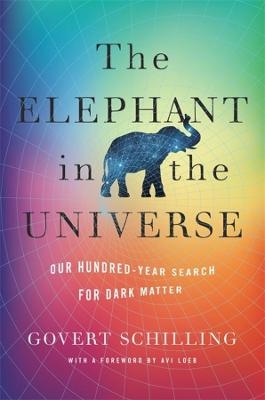
The Elephant in the Universe
Our Hundred-Year Search for Dark Matter
Seiten
2022
Harvard University Press (Verlag)
978-0-674-24899-1 (ISBN)
Harvard University Press (Verlag)
978-0-674-24899-1 (ISBN)
If existing models of the structure of the universe are correct, then 85 percent of the cosmos comprises a substance called dark matter. Yet no direct evidence of dark matter exists. Award-winning science journalist Govert Schilling details the quest to detect dark matter and how the search has helped us to understand the universe we inhabit.
An award-winning science journalist details the quest to isolate and understand dark matter—and shows how that search has helped us to understand the universe we inhabit.
When you train a telescope on outer space, you can see luminous galaxies, nebulae, stars, and planets. But if you add all that together, it constitutes only 15 percent of the matter in the universe. Despite decades of research, the nature of the remaining 85 percent is unknown. We call it dark matter.
In The Elephant in the Universe, Govert Schilling explores the fascinating history of the search for dark matter. Evidence for its existence comes from a wealth of astronomical observations. Theories and computer simulations of the evolution of the universe are also suggestive: they can be reconciled with astronomical measurements only if dark matter is a dominant component of nature. Physicists have devised huge, sensitive instruments to search for dark matter, which may be unlike anything else in the cosmos—some unknown elementary particle. Yet so far dark matter has escaped every experiment. Indeed, dark matter is so elusive that some scientists are beginning to suspect there might be something wrong with our theories about gravity or with the current paradigms of cosmology. Schilling interviews both believers and heretics and paints a colorful picture of the history and current status of dark matter research, with astronomers and physicists alike trying to make sense of theory and observation.
Taking a holistic view of dark matter as a problem, an opportunity, and an example of science in action, The Elephant in the Universe is a vivid tale of scientists puzzling their way toward the true nature of the universe.
An award-winning science journalist details the quest to isolate and understand dark matter—and shows how that search has helped us to understand the universe we inhabit.
When you train a telescope on outer space, you can see luminous galaxies, nebulae, stars, and planets. But if you add all that together, it constitutes only 15 percent of the matter in the universe. Despite decades of research, the nature of the remaining 85 percent is unknown. We call it dark matter.
In The Elephant in the Universe, Govert Schilling explores the fascinating history of the search for dark matter. Evidence for its existence comes from a wealth of astronomical observations. Theories and computer simulations of the evolution of the universe are also suggestive: they can be reconciled with astronomical measurements only if dark matter is a dominant component of nature. Physicists have devised huge, sensitive instruments to search for dark matter, which may be unlike anything else in the cosmos—some unknown elementary particle. Yet so far dark matter has escaped every experiment. Indeed, dark matter is so elusive that some scientists are beginning to suspect there might be something wrong with our theories about gravity or with the current paradigms of cosmology. Schilling interviews both believers and heretics and paints a colorful picture of the history and current status of dark matter research, with astronomers and physicists alike trying to make sense of theory and observation.
Taking a holistic view of dark matter as a problem, an opportunity, and an example of science in action, The Elephant in the Universe is a vivid tale of scientists puzzling their way toward the true nature of the universe.
Govert Schilling is the author of dozens of popular astronomy books, including Ripples in Spacetime: Einstein, Gravitational Waves, and the Future of Astronomy. He received the Eureka Prize from the Netherlands Organization for Scientific Research and the David N. Schramm Award from the American Astronomical Society. In 2007 the International Astronomical Union named an asteroid, 10986 Govert, in his honor. Avi Loeb is Frank B. Baird, Jr., Professor of Science at Harvard University. He is Founding Director of Harvard’s Black Hole Initiative, chair of the Board on Physics and Astronomy of the National Academies, and a fellow of the American Academy of Arts and Sciences.
| Erscheinungsdatum | 03.05.2022 |
|---|---|
| Vorwort | Avi Loeb |
| Zusatzinfo | 24 photos, 1 illus. |
| Verlagsort | Cambridge, Mass |
| Sprache | englisch |
| Maße | 140 x 210 mm |
| Gewicht | 590 g |
| Themenwelt | Naturwissenschaften ► Physik / Astronomie ► Astronomie / Astrophysik |
| ISBN-10 | 0-674-24899-6 / 0674248996 |
| ISBN-13 | 978-0-674-24899-1 / 9780674248991 |
| Zustand | Neuware |
| Haben Sie eine Frage zum Produkt? |
Mehr entdecken
aus dem Bereich
aus dem Bereich
Buch | Hardcover (2012)
Westermann Schulbuchverlag
CHF 44,90
Schulbuch Klassen 7/8 (G9)
Buch | Hardcover (2015)
Klett (Verlag)
CHF 29,90
Buch | Softcover (2004)
Cornelsen Verlag
CHF 23,90


